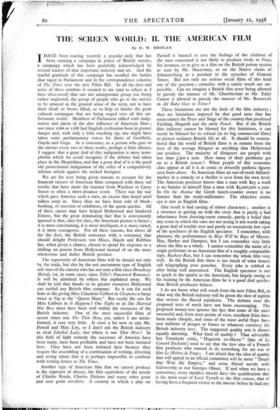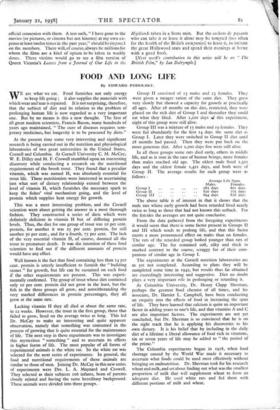THE SCREEN WORLD : IL THE AMERICAN FILM
By D. W. BROGAN IHAVE been reading recently a popular daily that has 1 been running a campaign in praise of British movies, a campaign which has been gratefully acknowledged by several leaders of that important industry and art. And the tearful gratitude of this campaign has recalled the battles that raged in Parliament and in the correspondence columns of The Times over the new Films Bill. In all the dust and noise of these combats it seemed to me (and to others as I have discovered) that one not unimportant group was being rather neglected, the group of people who go to the movies to be amused in the general sense of the term, not to have their ideals or brows lifted, or to help or hinder the great cultural campaigns that are being waged over all this un- fortunate world. _ Members of Parliament talked with indig- nation and alarm of the dire influence of American films ; not since 1o66 or 1588 had English civilisation been in greater danger and, with only a little touching up, one might have taken some parliamentary voices for those of Goebbels, Gayda and Goga. As a consumer, as a person who goes to the movies every two or three weeks, perhaps a little oftener, I suggest that a great deal of this indignation is mere xeno- phobia which we could recognise if the debates had taken place in the Skuptshina, and that a great deal of it is the good old protectionist indignation of the seller of a competitively inferior article against the wicked foreigner.
We are for ever being given reasons to account for the financial success of American films compared with those sad results that have made the journey from Wardour to Carey Street so often a short-distance event. There was the war which gave America such a start, an excuse that lasted until talkies came in. Since then we have been told of block- booking, of coercion of exhibitors, of the quota quickie. All of these causes may have helped Hollywood and hindered Elstree, but the great dominating fact that is conveniently ignored is that, class for class, the American picture is better ; it is more entertaining, it is more intelligent, it is more varied, it is more courageous. For all these reasons, but above all for the first, the British consumer with a constancy that should delight Professors von Mises, Hayek and Robbins has, when given a chance, chosen to spend his sixpence or a shilling on poison from Hollywood instead of on the more wholesome and duller British product.
The superiority of American films will be denied not only by the trade, but also by the not uncommon type of English refenner of the cinema who has not seen a film since Broadway Melody (or, in some cases, since Tillie's Punctured Romance). It will be admitted by others but explained away. We shall be told that thanks to its greater resources Hollywood can outbid any British film company. So it can for such feats as the giving Miss Gaudette Colbert in Cleopatra a barge twice as big as the Queen Mary.' But surely the sets for Miss Colbert in It Happened One Night or in She Married Her Boss must have been well within the resources of the British industry. One of the most successful films of recent times was The' Thin Man, yet, unless I am misin- formed, it cost very little. It costs a lot now to star Mr. Powell and Miss Loy, so I don't ask the British industry to rival Libelled Lady, but where is our Thin Man ? In this field of light comedy the successes of America have been many, have been profitable and have not been imitated here. They have not been imitated here because they require the assembling of a combination of writing, directing and acting talent that it is perhaps impossible to combine with writing letters to The Times.
Another type of American film that we cannot produce is the exposure of abuses, the film equivalent of the novels of Charles Reade, Charles Dickens and many other great and near great novelists. A country in which a play on Parnell is banned to save the feelings of the children of the men concerned is not likely to produce rivals to Fury, for instance, or to give us a film on the British'prison system as seen by Mr. Macarmey, or on the Native slums of Johannesburg as a pendant to the speeches of General Smuts. But not only are serious social films of this kind out of the question ; comedies with a satiric touch are im- possible. Can we imagine a British film actor being allowed to parody the manner of Mr. Chamberlain as -Mr. Eddy Cantor is allowed to parody the manner of Mr. Roosevelt in Ali Baba Goes to Town ?
These limitations are not the fault of the film industry ; they are limitations imposed by that good taste that has emasculated the Press and Stage of the country that produced Fielding, Hogarth and the early Punch. But if the British film industry cannot be blamed for this limitation, it can surely be blamed for its refusal (in its big commercial films) to picture ordinary British life at all. It should be remem- bered that the world of British films is as remote from the lives of the average filmgoer as anything that Hollywood can produce. The majority of filmgoers are people with less than £300 a year. How many of their problems get on to a British screen ? When people of this economic class appear at all it is as comic or absurdly pathetic figures seen from above. In American films an out-of-work billiard- marker in a comedy or a thriller is seen from his own level. The American producer knows that a man with $25 a week is no funnier in himself than a man with $5,000,000 a year. In On the Avenue the Greek lunch-counter owner is no funnier than the multi-millionaire. The objective • comic eye is rare in English films.
One result is bad casting of minor characters ; another is a slowness in getting on with the story that is partly a bad inheritance from drawing-room comedy, partly a belief that any scene in which the stars are not acting is not worth taking a great deal of trouble over and partly an excessively low view of the quickness of the English spectator. I remember, with pleasure, the performances in Boys Will be Boys of Messrs. Hay, Harker and Dampier, but I can remember very little about the film as a whole. I cannot remember the name of a single performer in an American film of a roughly comparable type, Rackety-Rax, but I can remember the whole film very well. In the British film there is too much of what boxers call telegraphing your punches. Every joke is rubbed in after being well announced. The English spectator is not as quick in the uptake as the American, but largely owing to his training by the American films he is a good deal quickei than British producers believe.
I do not know what will result from the new Films Bill, in what way the British industry will be given the shot of aspirin that revives the flaccid aspidistra. The debates over the proposed tests of merit have not been encouraging. The proposed money-test ignores the fact that some of the most successful and, from most points of view, excellent films have been made cheaply, and some of the most awful flops have cost millions of pengos or francs or whatever currency the British industry uses. The suggested quality test is almost equally alarming. What kind of quality ? That admirable but Trotskyite critic, " Huguette ex-Micro " (late of Le Canard Enchain) used to say that the first idea of a French film producer who wanted to do something for art was to film Le Maitre de Forges. I am afraid that the idea of quality that will appeal to an official committee will be more " Deeds that -Won the Empire," and some filmed novels with Galsworthy as our Georges Ohnet. If and when we have a committee, every member should have the qualification that is the main asset of Lord Tyrrell as the film censor, that of having been a frequent visitor to the movies before he had any official connexion with them. A test oath, " I have gone to the movies (or pictures, or cinema but not kinema) at my own ex- pense at least twelve times in the past year," should be imposed on the members. There will, of course, always be millions for whom the films are a kind of opium to be taken in weekly doses. These victims would go to see a film version of Queen Victoria's Leaves from a Journal of Our Life in the Highlands taken in a Scots mist. But the cochons de payants who can take it or leave it alone may be tempted (too often for the health of the British companies) to leave it, to imitate the great Hollywood stars and spend their evenings at home with a goal book.
[Next week's contribution to this series will be on " The British Film," by Ian Dalrymple.]















































 Previous page
Previous page